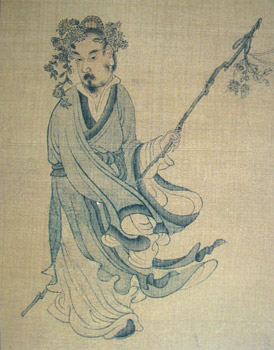“I beg you listen to this advice—
When you can get wine, be sure to drink it.”
Substance, Shadow, and Spirit, "Substance speaks to Shadow" (translation by A. Waley)
In A Hundred and Seventy Chinese Poems (1919), 'Poems By Tao Ch'ien', p. 106
Kontext: Heaven and Earth exist for ever:
Mountains and rivers never change.
But herbs and trees in perpetual rotation
Are renovated and withered by the dews and frosts:
And Man the wise, Man the divine—
Shall he alone escape this law?
Fortuitously appearing for a moment in the World
He suddenly departs, never to return.
How can he know that the friends he has left
Are missing him and thinking of him?
Only the things that he used remain;
They look upon them and their tears flow.
Me no magical arts can save,
Though you may hope for a wizard's aid.
I beg you listen to this advice—
When you can get wine, be sure to drink it.
